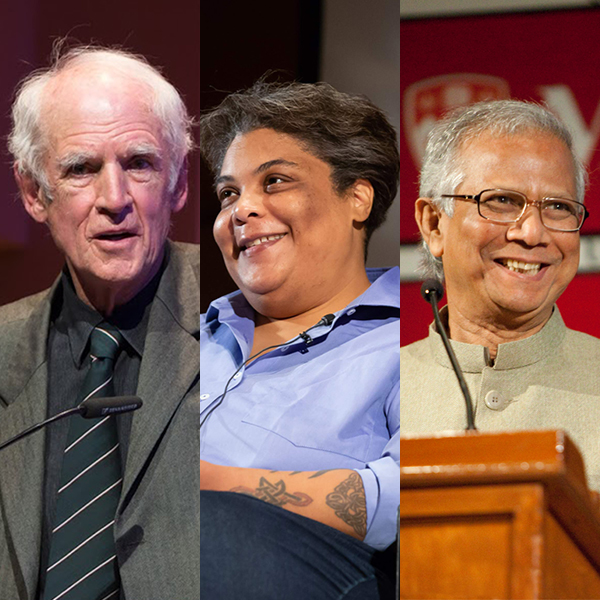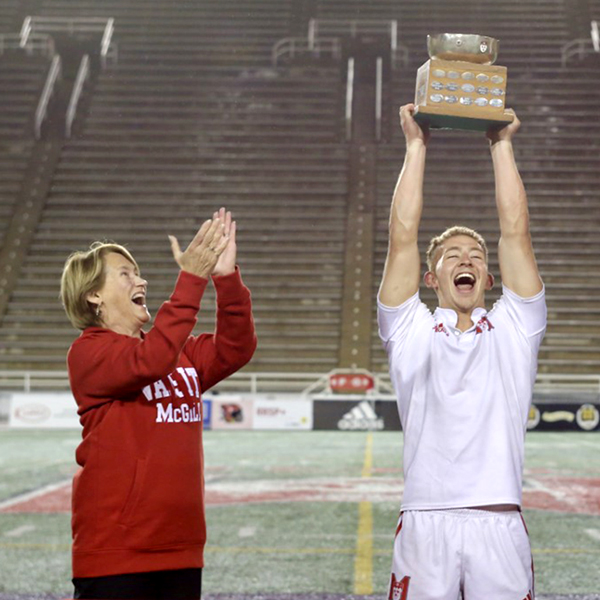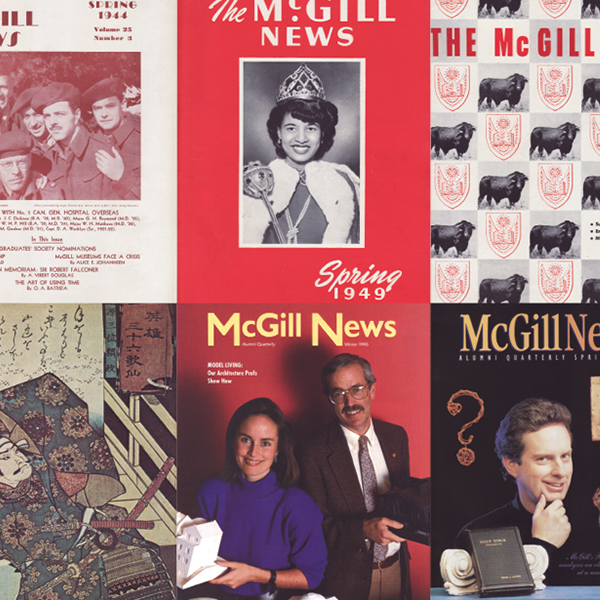McGill’s 200th anniversary hasn’t gone quite according to plan – no one could have guessed that COVID-19 would crash the party. As a consequence, the Bicentennial has been mostly celebrated online so far, with commemorative websites and virtual events (you should visit 200.mcgill.ca to see a lot of it for yourself). Some interesting in-person events are in the works for the months ahead, though, including a space-themed week in May involving McGill’s five astronaut alums.
That got us thinking. What was life like at McGill during other milestone years? What was the world like for those previous generations of McGillians? What happened during the 150th anniversary? The 100th?
1996/175th
Lucien Bouchard became Quebec’s premier, Mr. Dressup filmed his final show (some of you might need to ask your parents), Oprah launched her book club, and “Macarena” was Billboard’s top single for the year (sorry for the reminder, folks). Habs legend Maurice Richard broke down in tears at the official closing ceremony for the Montreal Forum when fans greeted him with what might have been the longest, most thunderous ovation in that building’s long history.
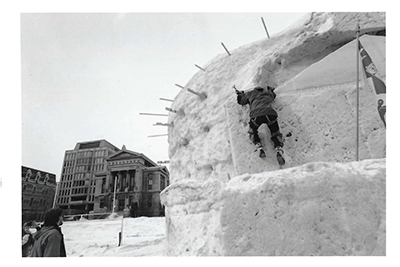
that was built for McGill’s 175th anniversary
Credit: McGill University Archives
As McGill celebrated its 175th anniversary, the University’s architecture professors took over portions of the downtown campus with special projects to mark the occasion.
Pieter Sijpkes, BSc(Arch)’71, BArch’74, led one effort that resulted in a 400-ton snow and ice replica of the Pantheon, while Avi Friedman, MArch’83, and his team built the Next Home, a versatile prototype for affordable housing.
A celebratory garden party featured several prominent McGillans, including Principal Bernard Shapiro, BA’56, LLD’88, Chancellor Gretta Chambers, BA’47, DLitt’01, and Board of Governors Chair Richard Pound, BCom’62, BCL’67, LLD’09, decked out in period costumes reflecting the fancy fashions of 175 years ago.
Robert Thirsk, MDCM’82, DSc’21, became the first McGill alum to travel to space as part of the crew of the Space Shuttle Columbia, participating in 41 experiments, including one designed by McGill space scientist Douglas Watt, BSc’65, MDCM’69, MSc’69, PhD’74, that examined the nature of motion sickness in a gravity-free environment.
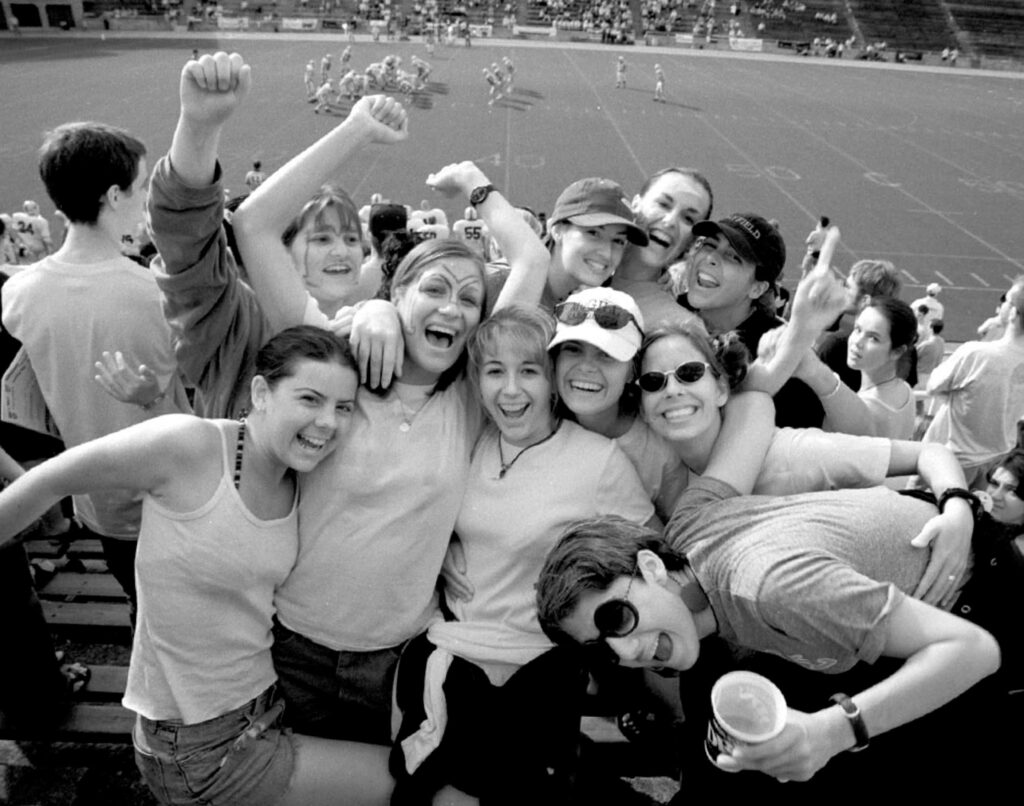
Credit: Owen Egan
Computer science professor Monty Newborn played a key role in one of the year’s most talked about stories, serving as the chief organizer for a historic chess match between world champion Garry Kasparov and IBM’s Deep Blue supercomputer (Kasparov prevailed, but would lose the rematch a year later).
McGill students made their own mark in many ways. Anne Andermann, BSc’94, MDCM’02, and Christine Soon Desmarais, BEng’97, received Rhodes Scholarships, Matthew Cohen, BA’96, and Jamie Springer, BA’98, were named the top team at the North American Debating Championships, the members of the McGill Symphony Orchestra performed alongside the Orchestre symphonique de Montréal in a triumphant joint concert, and nine McGill students travelled to Atlanta to take part in the Summer Olympics.
Mathematics and physics student Marco Gualtieri, BSc’99, also stood out, winning the under-20 category of the National Whistling Competition in the U.S. with his renditions of works by Mozart and Bach. Just one of his many skills, as Gualtieri would prove two years later when he earned a Rhodes Scholarship of his own.
1971/150th
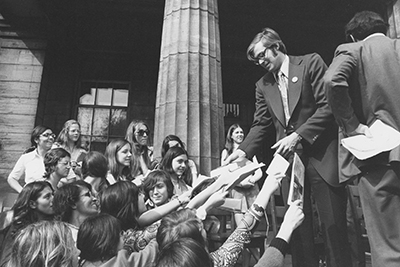
Credit: McGill University Archives
McGill students graduating in 1971 had lived through some tumultuous times in Montreal, experiencing both the McGill Français protest of 1969 (roughly 10,000 participated in a march demanding that McGill become a French-speaking institution), and the October Crisis of 1970 (involving, among other things, the murder of a Quebec cabinet minister by nationalist terrorists, and the controversial use of the War Measures Act which gave the police sweeping powers).
McGill physics professor Robert Bell, PhD’48, DSc’79, had become the University’s newest principal the previous year. Also in 1970, the roles of chancellor and board of governors chair were split in two – until then, a single individual held both titles. Burnside Hall opened in 1971 and construction was underway for the Samuel Bronfman and Education Buildings. Arts and Science, previously a single entity, became two separate faculties.
Movies advertised in the McGill Daily included Five Easy Pieces, Little Big Man, and Easy Rider, while one of the hottest books on campus was Erich Segal’s Love Story (coincidently, David Johnston, who would become McGill’s principal in 1979, served as the inspiration for a secondary character in that book – Johnston and Segal had attended Harvard together).
Molson Hall became McGill’s first co-ed student residence. According to one male student quoted in the McGill News, “Molson Hall has become more mature and less juvenile,” now that women were living there too.
McGill’s Sesquicentennial planners combined Open House and Homecoming for a memorable series of fall events that included the restaging of three plays from 1821, an on-campus Ferris wheel, an Oktoberfest beer garden, and speakers and panelists ranging from Future Shock author Alvin Toffler to Parti Québécois leader René Lévesque. More than 5,000 people took part. Three members of the McGill Skydiving Club earned cheers as they parachuted down to campus during the festivities.
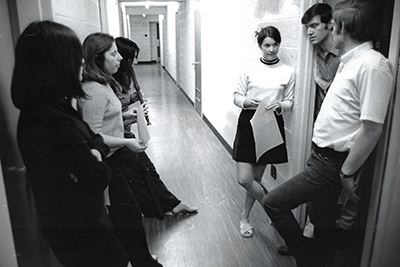
There was no doubt about who the big man on campus was that year. Ken Dryden, LLB’73, LLD’18, a McGill law student, became the city’s newest sports hero when he joined the Montreal Canadiens as a rookie goaltender and helped lead them to an improbable Stanley Cup victory.
1946/125th
The Second World War, which officially ended in 1945 with Japan’s surrender, had an immense impact on McGill. Roughly 5,500 men and women connected to McGill – faculty, staff, students and graduates – had enlisted for military service. About 300 individuals with close ties to McGill died in the war.
The most famous convocation ceremony in the University’s history took place in 1944, when honorary degrees were awarded to U.S. President Franklin D. Roosevelt and British Prime Minister Winston Churchill. The special ceremony took place in Quebec City, where the Allied leaders were meeting.
In his contribution to the Old McGill yearbook of 1946, Principal F. Cyril James told the University’s newest graduates, “It will be your task to build upon the ruins, to create a better society.”
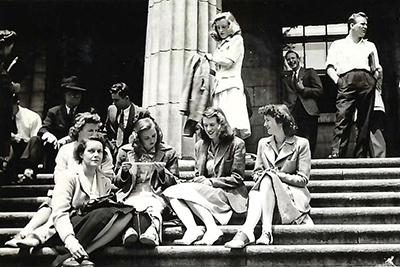
The return of war veterans from overseas service contributed to a huge increase in McGill’s student numbers – from about 3,200 before the war to roughly 8,000 at the start of 1947.
Sir William Dawson College in St. Johns, Quebec – about 30 miles from Montreal – was set up as a residential college for veterans taking first-year McGill courses in science and engineering. Formerly a training facility for air navigators during the war, the college now served as a temporary home for hundreds of McGill students who had seen military service – and who, in some cases, had wives and children. Officers’ quarters were converted into apartments for married couples.
In some ways, life at McGill began returning to normal. The Red and White Revue, a student theatrical troupe that staged musical productions, performed four sold-out shows at Moyse Hall, “the first after a lapse of five war years.”
Tupperware, the Cannes Film Festival and the bikini all made their debuts in 1946. The United Nations held its first meeting. Montrealers embraced a new sports hero who was poised to make history. Jackie Robinson would become the first Black man to play baseball in the major leagues in 1947, but first, he spent a season with the minor league Montreal Royals, leading the league in batting average and runs scored, and leading his team to a championship.
To mark the University’s 125th anniversary, The McGill You Knew was published. The book, which offered a breezy look at the University’s history, was written by Edgar Andrew Collard, MA’37, a future editor-in-chief of The Montreal Gazette.
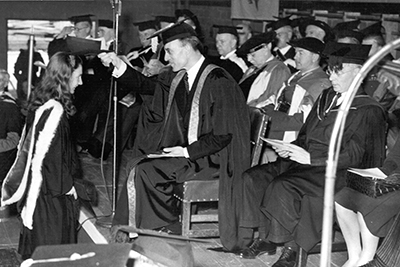
Credit: McGill University Archives
Law professor John Humphrey, BCom’25, BA’27, BCL’29, PhD’45, LLD’76, began a two-year leave of absence from McGill (it would end up being a lot longer than that) to serve as the director of the UN’s Human Rights Division. Working closely with former U.S. First Lady Eleanor Roosevelt, Humphrey would play an instrumental role in crafting the Universal Declaration of Human Rights – he is even credited with writing the first draft of what Roosevelt would describe as “the Magna Carta of all mankind.”
1921/100th
The Class of 1921 had lived through not one, but two catastrophic worldwide events – the First World War and the 1918 flu pandemic. The latter resulted in 50,000 deaths across Canada between 1918 and 1920, and reports of its impact from those years – the widespread use of masks, economic disarray, hospitals filled with the sick – feel all too familiar today. According to the Old McGill yearbook of 1921, “the ‘flu’ came and gave us a month’s holiday” as it disrupted the University’s operations in the fall of 1918.
More than 3,000 McGillians enlisted to serve during the war and 363 of them died. McGill’s Faculty of Medicine, led by its dean, Herbert Stanley Birkett, organized the No. 3 Canadian General Hospital, the country’s first university-affiliated unit of its kind. Staffed by doctors and nurses from McGill and its teaching hospitals, the unit, stationed in France, performed 11,395 surgeries between 1915 and 1919, and treated 143,762 patients.
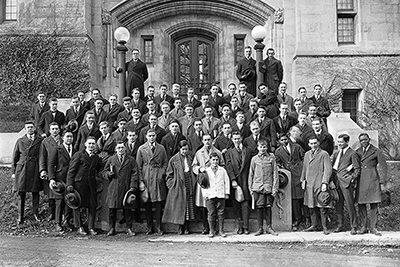
In 1919, many at McGill were startled to learn that their next principal would be none other than Sir Arthur Currie, the famous general who had led the Canadian forces during the final years of the First World War. Currie didn’t fit the mould of most university presidents – he had no university degree, for one thing – but he would win over the skeptics. Sir Andrew Macphail, MDCM 1891, a McGill medical professor, was no fan of the appointment initially. “In no long time, [Currie] mastered every detail with a thoroughness that astonished even those who had spent a lifetime within these walls,” Macphail later admitted.
Some of the era’s entertainment options were reflected in McGill Daily editions from 1921, which carried ads for silent films like Cecil B. DeMille’s The Affairs of Anatol, and for vaudeville shows headlined by such performers as Gertrude Vanderbilt.
The student newspaper also ran ads for elegant “caps made of the finest English Tweeds”, “high-class” overcoats, and men’s suits with “fancy stripes and checks.” One student from that era, quoted in The McGill You Knew, declared that he and his classmates took pride in dressing well. “Spats were not considered the mark of a fop.”
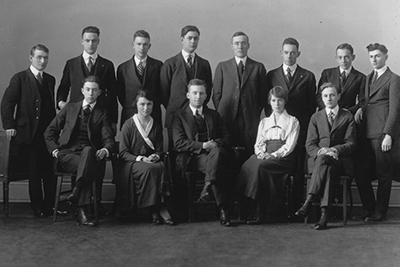
Credit: McCord Museum
In October that year, McGill held its Centenary Reunion, attracting scores of “out-of-town sons and daughters of Old McGill” back to campus. More than 3,000 took part in the festivities.
The first five women to study medicine at McGill were only a year away from graduating. When they completed their degrees, they were fêted at a party at the Ritz Carleton organized by Maude Abbott, BA 1890, MDCM 1910 (honorary), LLD’36, the legendary McGill cardiology expert who had long championed for women to be able to pursue medical careers – she herself had not been permitted to study medicine at McGill (she earned her medical degree at Bishop’s University instead).
1896/75th
It is unclear if the University marked its 75th anniversary in any specific way, but it certainly organized one heck of a shindig to start off the year. In January, Donald Smith, McGill’s chancellor, presided over the University Dinner at the Windsor Hotel with a guest list that included all of McGill’s professors and students – even the “Donaldas,” McGill’s female students, who were usually kept apart from their male peers.
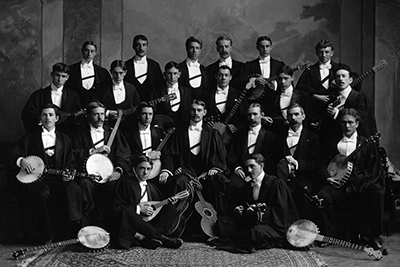
Credit: McCord Museum
Lord Aberdeen, the Governor General, was in attendance, along with several dignitaries, including the presidents of Harvard and the University of Toronto, Ontario’s education minister, and the leader of the Liberal Party of Canada, Wilfrid Laurier, BCL 1866, who would make history later that year when he became Canada’s first francophone prime minister. The menu for the multi-course meal included oysters, roast turkey, partridge with bread sauce, and English plum pudding. A bugle call announced when the feasting was done, and the partying carried on until midnight.
William Peterson had become McGill’s new principal the year before. One of his first acts was to revamp McGill’s language requirements. Students no longer had to study both Greek and Latin for two years at the University – they could take one or the other. He continued the efforts begun by his predecessor Sir William Dawson in establishing McGill as an internationally recognized centre of scientific research. Within two years, physicist Ernest Rutherford would accept a position at the University that put him on the path towards his Nobel Prize.
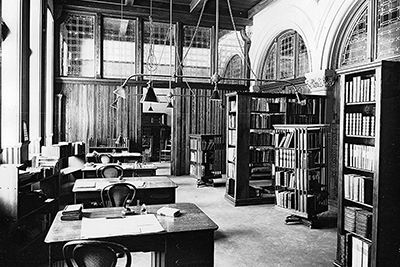
The Redpath Library and the Macdonald Physics and Engineering Buildings all opened in 1893, along with the Royal Victoria Hospital (McGill medical professor Thomas Roddick was the hospital’s first surgeon-in-chief). McGill’s Department of Architecture (later to become a school) was created in 1896.
James Ogilvy & Sons (now Holt Renfrew Ogilvy) and Hamilton’s department store joined Morgan’s (now Hudson’s Bay) along Sainte-Catherine, as the downtown street replaced Old Montreal to become the city’s new main shopping district.
Students playing hockey on campus was a familiar sight in the winter, and women (wearing long skirts) began playing the sport at McGill in 1896. Montreal’s horse-drawn streetcars were retired in 1894 to make way for the city’s new electric streetcars.
Puccini’s La bohème premiered in Turin, Queen Victoria became the longest-reigning monarch in British history, and the first modern Olympics took place in Athens. John Cox, McGill’s Macdonald Professor of Physics, was the lead author of a groundbreaking paper that demonstrated the medical potential of an exciting new technology discovered in 1895 – X-rays. Cox had used an X-ray image to help doctors find an elusive bullet lodged in a patient’s leg.
